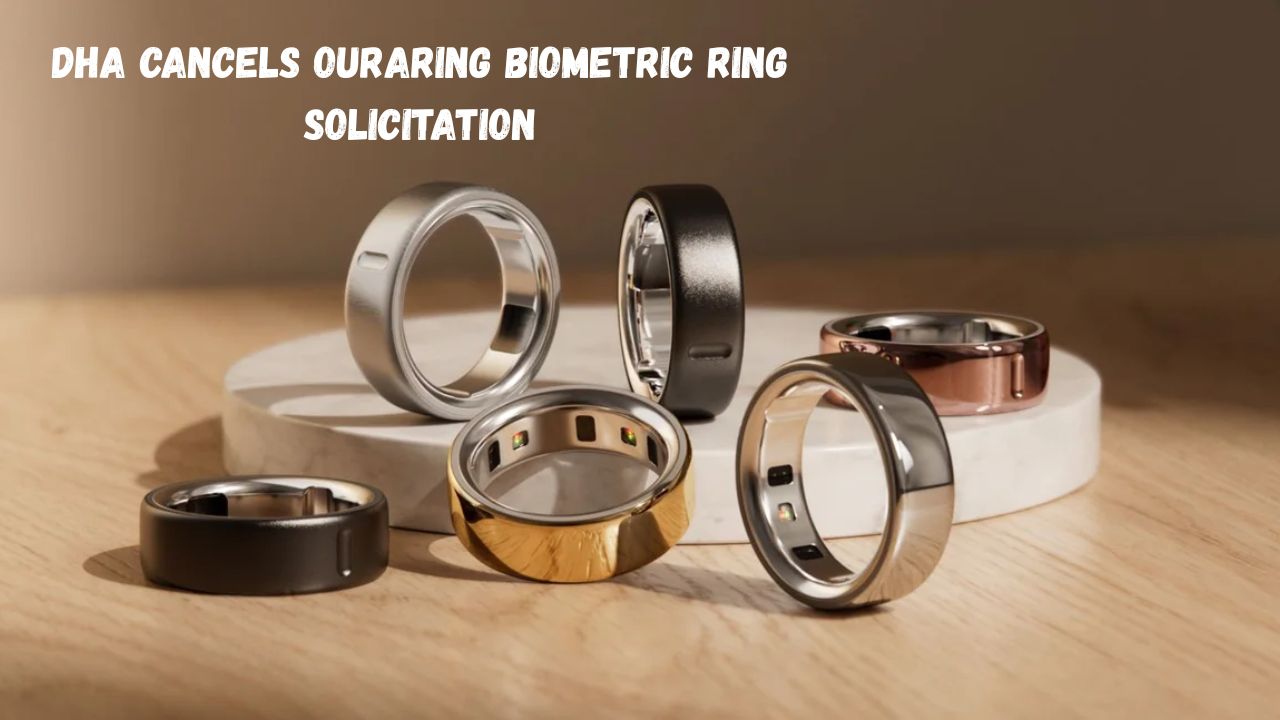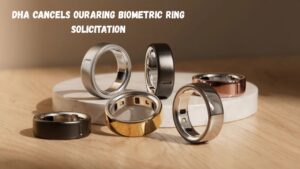The Defense Health Agency (DHA) once planned a big $96 million contract to buy OuraRing biometric rings for soldiers and staff. These smart rings were meant to track health, stress, and recovery. But DHA has now cancelled this plan, saying the deal is no longer needed.
This decision is important because it shows how defense health programs can quickly change. In the next sections, I will explain what the deal was about, why it was cancelled, what problems came up, and what this means for future wearable technology in defense.
| Fact | Details |
|---|---|
| Contract Value | $96 million planned deal |
| Contract Type | Sole-source (only Oura was selected) |
| Purpose | Track health, stress, recovery, resilience of service members |
| Selected Device | OuraRing biometric smart ring |
| Competitor Protest | WHOOP filed protest with GAO (Government Accountability Office) |
| Main Issue Raised | Requirement for ring-only form factor, seen as unfair to other wearables |
| Lawmaker Concerns | Questions on vendor preference and lack of transparency |
| DHA Statement | Acquisition “no longer required” |
| Official Cancellation Date | March 2025 (announcement) |
| Future Outlook | Possible new solicitations including rings, bands, watches, and other wearables |
What Was the OuraRing Solicitation About?
The Defense Health Agency (DHA) wanted to start a big program to use smart wearables for health monitoring. The plan was to spend about $96 million on the OuraRing contract. This was not a small deal. It was meant to cover both the rings and the software platform that comes with them.
DHA’s idea was simple. If soldiers and staff wear these rings, leaders can see health data like sleep, stress, and recovery in real time. The rings could help track resilience, prevent burnout, and even improve readiness. For the agency, it looked like a modern way to use tech for health and performance.
The OuraRing was picked because it is already cleared for use in secure areas and it collects detailed biometric data. For DHA, it seemed like the perfect tool to study stress and recovery patterns. But the plan did not go smoothly.
Why Did DHA Cancel the Solicitation?
Protests from Competitors
Soon after the deal was announced, a rival company named WHOOP filed a protest with the Government Accountability Office (GAO). You can read about it in this Breaking Defense report. WHOOP argued that the contract was unfair because it was sole-source, meaning only one company—Oura—was chosen.
In government contracts, competition is important. By going with just one vendor, DHA raised questions about fairness. WHOOP claimed that other devices, like fitness bands and watches, can do the same job.
Vendor Preference & “Ring” Form Factor Debate
Another big issue was the form factor. DHA specifically asked for a ring. Critics said this was strange, because many health wearables exist in other shapes, like watches or chest straps. By making the contract “ring only,” DHA was accused of showing vendor preference a choice that looked like it was designed just for Oura.
This rule upset not only WHOOP but also lawmakers. Some members of Congress questioned why DHA would cut out so many possible options. The criticism grew louder and pushed the agency into a corner.
Changing Priorities Inside DHA
In the end, DHA made a simple statement: the project was “no longer required.” You can see the official update here on Breaking Defense.
This shows that the agency decided to shift its focus. Health technology is always changing, and sometimes funds are moved to other projects. By cancelling this deal, DHA showed that wearable rings are not a top priority right now.
Were Privacy or Security Concerns a Factor?
Some people thought the program was stopped because of privacy risks or data security issues. After all, biometric wearables collect very personal health data. However, DHA never gave this as the reason.
Instead, the agency made it clear: the cancellation was about procurement and priorities, not about data leaks. Reports like Biometric Update confirmed that the official reason was simply that the program was no longer needed.
This means the cancellation was more about process and fairness than about privacy.
Industry and Policy Reactions
Competitors’ Response
For WHOOP and other rivals, the cancellation felt like a big win. They had argued that the deal gave Oura an unfair edge. When DHA pulled back, it proved that their protest made an impact.
WHOOP’s main point was about fair competition. In government contracts, every qualified company should have a chance. By cancelling the ring-only deal, DHA opened the door for more vendors in the future. Reports like Breaking Defense noted that this outcome was widely seen as a success for open competition.
Lawmakers’ Oversight Role
Members of Congress also played a part in the debate. Some lawmakers raised concerns about transparency and whether the deal was designed in a fair way. They questioned why DHA insisted on a ring instead of allowing watches, bands, or other wearables.
Congress often steps in when contracts look too narrow. This oversight helps keep government spending accountable. By shining a light on the issue, lawmakers added pressure on DHA to rethink its approach.
Implications for Future Wearables Contracts
This cancellation could change how DHA and other defense agencies buy wearable tech in the future. Instead of sole-source contracts, the trend may move toward open competitions where many companies can bid.
That means devices like rings, watches, and bands may all be considered next time. It also signals that the government wants to avoid the appearance of favoring one vendor. As Breaking Defense explained earlier, future solicitations might focus more on capabilities than on form factor.
What Happens Next?
1: Status of GAO Protest After Cancellation
When DHA cancelled the program, the GAO protest from WHOOP became unnecessary. GAO usually reviews protests when contracts move forward, but if the deal is cancelled, the protest ends too. That means DHA avoided a drawn-out legal fight by stopping the contract early.
2: Possible Future Solicitations for Broader Wearables
The cancellation does not mean DHA has lost interest in wearable health technology. Instead, it may come back later with a new solicitation that is more open. That future request could include rings, bands, watches, or other devices instead of locking into one shape.
This gives the agency more flexibility and also gives vendors a fair chance. It could also make the program stronger, because DHA can pick the best tech across many platforms.
3: Impact on Oura and Rival Companies in Defense Health Tech
For Oura, this cancellation is a setback. They were close to landing a $96 million deal that would have expanded their role in defense health. Without it, they must wait for new opportunities.
For rival companies, the news is more positive. WHOOP and others now have a chance to compete fairly in future solicitations. The cancellation shows that DHA and the defense sector are willing to listen to concerns about fairness and choice.
In the bigger picture, the cancellation may push the defense health tech market toward more open, competitive contracts. That could mean more innovation and better deals for the government in the long run.
Conclusion: DHA Cancels Ouraring Biometric Ring Solicitation
In the end, the cancellation of the OuraRing biometric ring solicitation shows how quickly defense health priorities can change when fairness and competition are questioned. DHA first saw the $96 million deal as a way to improve stress and recovery tracking, but protests from rivals, concerns about vendor preference, and shifting priorities forced a rethink.
The outcome gives competitors like WHOOP a chance to compete in the future and sends a clear signal that open and fair processes matter more than favoring one device. For Oura, it was a lost opportunity, but for the wider defense health tech market, it may lead to stronger, more competitive programs that bring better results for the military and its people.








